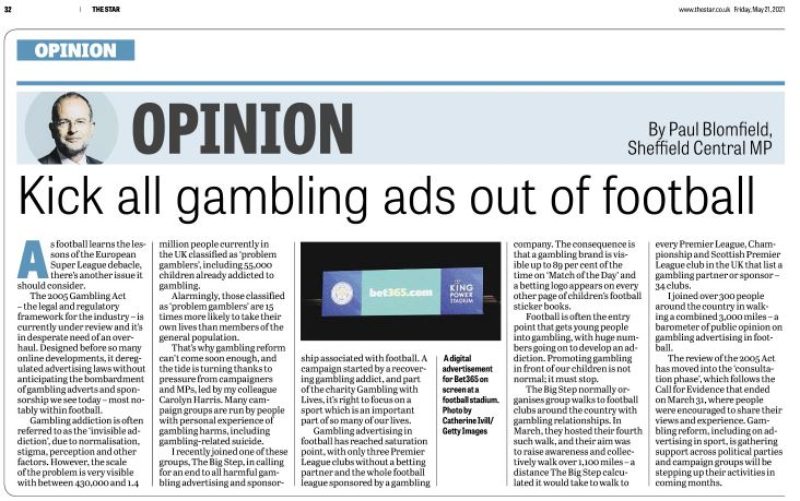Paul Blomfield A strong voice for Sheffield Central
I was pleased to write in the Star today about the need to ban gambling advertisements from football. As fans begin to return to grounds and men’s football is coming back Freeview TV in less than three weeks’ time when the European Championships get underway, it has never been a more important time to stop gambling companies using the game. I joined recovering gambling addicts, charities and others in writing to the Chair of ITV and other TV channels last month (see here), and I outlined my thoughts about football and gambling harm in the article – which you can read below:
As football learns the lessons of the European Super League debacle, there’s another issue it should consider. The 2005 Gambling Act – the legal and regulatory framework for the industry – is currently under review and it’s in desperate need of an overhaul. It is an analogue act operating in a digital age. Designed before so many online developments, it deregulated advertising laws without anticipating the bombardment of gambling adverts and sponsorship we see today – most notably within football.
Gambling addiction is often referred to as the ‘invisible addiction’, due to normalisation, stigma, perception and other factors. However, the scale of the problem is very visible with between 430,000 and 1.4 million people currently in the UK classified as ‘problem gamblers’, including 55,000 children already addicted to gambling.
Alarmingly, those classified as ‘problem gamblers’ are 15 times more likely to take their own lives than members of the general population, with research indicating that there could be as many as 250 to 650 gambling-related suicides in the UK every year.
That’s why gambling reform can’t come soon enough, and the tide is turning thanks to pressure from campaigners and MPs, led by my colleague Carolyn Harris. Many campaign groups are run by people with personal experience of gambling harms, including gambling related suicide.
I recently joined one of these groups, The Big Step, in calling for end to all harmful gambling advertising and sponsorship associated with football. A campaign started by a recovering gambling addict, and part of the charity Gambling with Lives, it’s right to focus on a sport which is an important part of so many of our lives.
Gambling advertising in football has reached saturation point, with only three Premier League clubs without a betting partner and the whole football league sponsored by a gambling company. The consequence is that a gambling brand is visible up to 89% of the time on ‘Match of the Day’ and a betting logo appears on every other page of children’s football sticker books.
Football is often the entry point that gets young people into gambling, with huge numbers going on to develop an addiction. The Big Step is made up of many people in recovery from gambling addiction and affected others, with the majority speaking about how the normalisation of gambling in football was harmful throughout their addiction. Promoting gambling in front of our children is not normal; it must stop.
The Big Step normally organises group walks to football clubs around the country with gambling relationships. In March, they hosted their fourth such walk, and their aim was to raise awareness and collectively walk over 1,100 miles – a distance The Big Step calculated it would take to walk to every Premier League, Championship and Scottish Premier League club in the UK that list a gambling partner or sponsor – 34 clubs.
This event was by far the biggest, and I joined over 300 people around the country in walking a combined 3,000 miles – a barometer of public opinion on gambling advertising in football. By way of comparison, The Big Step’s first walk, back in 2019, had just 15 participants.
The review of the 2005 Act has moved into the ‘consultation phase’, which follows the Call for Evidence that ended on 31st March, where people were encouraged to share their views and experience. Gambling reform, including on advertising in sport, is gathering support across political parties and campaign groups will be stepping up their activities in coming months.

